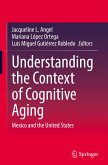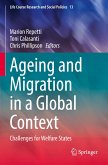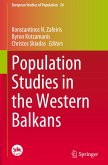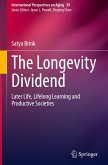Understanding the Context of Cognitive Aging
Mexico and the United States
Herausgegeben:Angel, Jacqueline L.; López Ortega, Mariana; Gutierrez Robledo, Luis Miguel
Understanding the Context of Cognitive Aging
Mexico and the United States
Herausgegeben:Angel, Jacqueline L.; López Ortega, Mariana; Gutierrez Robledo, Luis Miguel
- Broschiertes Buch
- Merkliste
- Auf die Merkliste
- Bewerten Bewerten
- Teilen
- Produkt teilen
- Produkterinnerung
- Produkterinnerung
This book provides a bi-national portrait of dementia in the rapidly aging Mexican-origin population in Mexico and the United States. It provides a comprehensive overview of critical conceptual and methodological issues in the study of cognitive aging and related mental and physical conditions. The book examines the sources of vulnerability and their consequences for Mexican-origin and for "aging in place". By providing a combination of new knowledge, empirical evidence, and fresh approaches of dementia support in later life, this book will contribute to moving the field of Mexican-origin…mehr
Andere Kunden interessierten sich auch für
![Understanding the Context of Cognitive Aging Understanding the Context of Cognitive Aging]() Understanding the Context of Cognitive Aging149,79 €
Understanding the Context of Cognitive Aging149,79 €![Ageing and Migration in a Global Context Ageing and Migration in a Global Context]() Ageing and Migration in a Global Context97,99 €
Ageing and Migration in a Global Context97,99 €![Population Studies in the Western Balkans Population Studies in the Western Balkans]() Population Studies in the Western Balkans104,99 €
Population Studies in the Western Balkans104,99 €![Ageing and Migration in a Global Context Ageing and Migration in a Global Context]() Ageing and Migration in a Global Context97,99 €
Ageing and Migration in a Global Context97,99 €![The Longevity Dividend The Longevity Dividend]() Satya BrinkThe Longevity Dividend90,99 €
Satya BrinkThe Longevity Dividend90,99 €![The Longevity Dividend The Longevity Dividend]() Satya BrinkThe Longevity Dividend90,99 €
Satya BrinkThe Longevity Dividend90,99 €![Trends and Determinants of Healthy Aging in China Trends and Determinants of Healthy Aging in China]() Trends and Determinants of Healthy Aging in China112,99 €
Trends and Determinants of Healthy Aging in China112,99 €-
-
-
This book provides a bi-national portrait of dementia in the rapidly aging Mexican-origin population in Mexico and the United States. It provides a comprehensive overview of critical conceptual and methodological issues in the study of cognitive aging and related mental and physical conditions. The book examines the sources of vulnerability and their consequences for Mexican-origin and for "aging in place". By providing a combination of new knowledge, empirical evidence, and fresh approaches of dementia support in later life, this book will contribute to moving the field of Mexican-origin aging and health forward. By focusing on the serious challenges in old-age support for older people with dementia and neurocognitive disorders in two different contexts, this book will deepen academics, researchers, students and young investigators understanding of what is necessary to achieve optional care.
Produktdetails
- Produktdetails
- Verlag: Springer / Springer International Publishing / Springer, Berlin
- Artikelnr. des Verlages: 978-3-030-70121-5
- 1st edition 2021
- Seitenzahl: 392
- Erscheinungstermin: 5. August 2022
- Englisch
- Abmessung: 235mm x 155mm x 22mm
- Gewicht: 593g
- ISBN-13: 9783030701215
- ISBN-10: 3030701212
- Artikelnr.: 64285554
- Herstellerkennzeichnung
- Springer-Verlag GmbH
- Tiergartenstr. 17
- 69121 Heidelberg
- ProductSafety@springernature.com
- Verlag: Springer / Springer International Publishing / Springer, Berlin
- Artikelnr. des Verlages: 978-3-030-70121-5
- 1st edition 2021
- Seitenzahl: 392
- Erscheinungstermin: 5. August 2022
- Englisch
- Abmessung: 235mm x 155mm x 22mm
- Gewicht: 593g
- ISBN-13: 9783030701215
- ISBN-10: 3030701212
- Artikelnr.: 64285554
- Herstellerkennzeichnung
- Springer-Verlag GmbH
- Tiergartenstr. 17
- 69121 Heidelberg
- ProductSafety@springernature.com
Jacqueline L. Angel investigates informal and formal supports of older people with dementia and related disorders in Mexico and the United States. The work builds on research funded by the National Institute on Aging in 1992 and involves dyadic analyses of dementia caregiving in a large twenty-year cohort study of Mexican Americans in the Southwestern United States with a special focus on immigrant families. Mariana López Ortega is a part of the academic working groups of two national surveys in Mexico, the latest waves of the Mexican Health and Aging Study, and in the development of the module for adults 60 years and older of the Mexican National Health and Nutrition Survey. This work provides a representative sample of this age group for the first time, with specific questions aimed at investigating specific epidemiologic issues specific to this stage of life. She has also participated in the generation of research and reports with international organizations that are highly relevant in ageing, social support and dementia research. Luis Miguel Gutierrez Robledo is the founding Director of the National Institute of Geriatrics and Coordinator of the Mexican network for research on aging. He has been involved in research on public health and aging since the early 90's and is an stablished scholar in the field.
Part I: Concepts, theory and measurement of mental and cognitive health Section Editor: Kyriakos Markides.- Chapter 1. Cognitive Domains in Low Literacy Populations: The Experience of the Maracaibo Aging Study.- Chapter 2. The Role of Discrimination on Latinxs' Use of Mental Health Services: A LatCrit and Life-Course Perspective.- Chapter 3. Links between Mental Health and Physical Health, Their Impact on the Quality of Life of the Elderly, and Challenges for Public Health. Chapter 4. Questions and Conundrums: How Qualitative Methods Can Help Us Understand the Health Needs of the Elderly.- Part II: Old Diseases and New Plagues.- Chapter 5. Potentially Modifiable Risk Factors for Dementia in Lower- and Middle-Income Countries.- Chapter 6. Rural and Urban Differences in Cognitive Healthy Life Expectancies among Older Adults in Mexico.- Chapter 7. A New Perspective on Redefining and Preventing Diabetes to Prevent Dementia in High-Risk Populations.- Chapter 8. Religious Involvement, HealthLocus of Control, and Sleep Disturbance: A Study of Older Mexican Americans.- Part III: Caregiving and long-term care services and supports including dementia care.- Chapter 9. Mental Health and Aging in Mexico and the United States: The New Urban Reality.- Chapter 10. Unmet Needs for Personal Assistance among Older Adults in Mexico: 2001-2015.- Chapter 11. Dementia Support among Older Mexican-Americans: Is Adult Day Health Center a Viable Alternative?.- Part IV: Emerging Issues in Cognitive Aging and Mental Health.- Chapter 12. Can Brain Health Interventions Reduce Mexico's Dementia Burden? An Essay.- Chapter 13. Impact of Supplemental Income on Major Depressive Episodes of Older Adults in Mexico.- Chapter 14. The Macro Realities of Population Aging: Policy Trends Impacting Aging, Health and Mental Health in the Americas.- Chapter 15. Gerontology and Geriatrics, Sustainable Development Goals, and the United Nations.- Part V: Section Editor: Emma Aguila.- Chapter 16. Framing Challenges of Dementia and Mental Health Care in Mexican-origin Older Adults in Mexico and the United States: Consensus Agenda Findings and Recommendations.- Chapter 17. Mind the Gap: A Scoping Review of Aging and Diabetes in Mexico.- Chapter 18. Profiles of Social Coping Resources among Latinos: A Latent Latent Class Analysis.
Part I: Concepts, theory and measurement of mental and cognitive health Section Editor: Kyriakos Markides.- Chapter 1. Cognitive Domains in Low Literacy Populations: The Experience of the Maracaibo Aging Study.- Chapter 2. The Role of Discrimination on Latinxs' Use of Mental Health Services: A LatCrit and Life-Course Perspective.- Chapter 3. Links between Mental Health and Physical Health, Their Impact on the Quality of Life of the Elderly, and Challenges for Public Health. Chapter 4. Questions and Conundrums: How Qualitative Methods Can Help Us Understand the Health Needs of the Elderly.- Part II: Old Diseases and New Plagues.- Chapter 5. Potentially Modifiable Risk Factors for Dementia in Lower- and Middle-Income Countries.- Chapter 6. Rural and Urban Differences in Cognitive Healthy Life Expectancies among Older Adults in Mexico.- Chapter 7. A New Perspective on Redefining and Preventing Diabetes to Prevent Dementia in High-Risk Populations.- Chapter 8. Religious Involvement, HealthLocus of Control, and Sleep Disturbance: A Study of Older Mexican Americans.- Part III: Caregiving and long-term care services and supports including dementia care.- Chapter 9. Mental Health and Aging in Mexico and the United States: The New Urban Reality.- Chapter 10. Unmet Needs for Personal Assistance among Older Adults in Mexico: 2001-2015.- Chapter 11. Dementia Support among Older Mexican-Americans: Is Adult Day Health Center a Viable Alternative?.- Part IV: Emerging Issues in Cognitive Aging and Mental Health.- Chapter 12. Can Brain Health Interventions Reduce Mexico's Dementia Burden? An Essay.- Chapter 13. Impact of Supplemental Income on Major Depressive Episodes of Older Adults in Mexico.- Chapter 14. The Macro Realities of Population Aging: Policy Trends Impacting Aging, Health and Mental Health in the Americas.- Chapter 15. Gerontology and Geriatrics, Sustainable Development Goals, and the United Nations.- Part V: Section Editor: Emma Aguila.- Chapter 16. Framing Challenges of Dementia and Mental Health Care in Mexican-origin Older Adults in Mexico and the United States: Consensus Agenda Findings and Recommendations.- Chapter 17. Mind the Gap: A Scoping Review of Aging and Diabetes in Mexico.- Chapter 18. Profiles of Social Coping Resources among Latinos: A Latent Latent Class Analysis.









